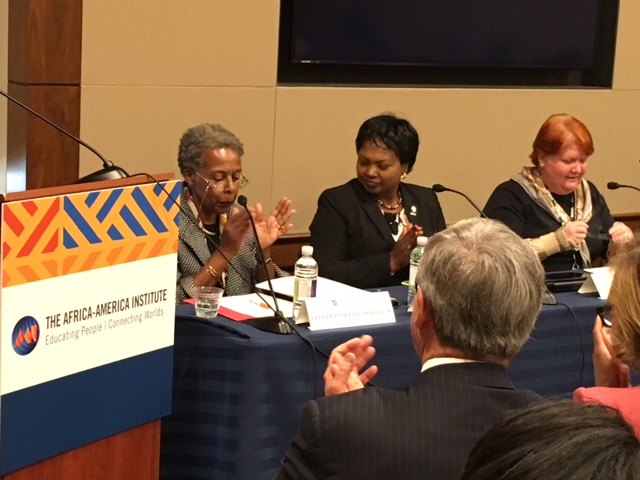- April 21, 2016
On April 21st, 2016, Ambassador Mukantabana attended the Conversations on Africa Forum on Capitol Hill in Washington, D.C. This event was hosted by The Africa-America Institute. As President Obama’s administration comes to its end, the Conversation on Africa series adopted the theme: Looking Ahead: Setting American Policy in Africa for the Next U.S. President” as a way to offer a platform for congressional leaders, U.S. Government officials, policy experts and Members of the African Diplomatic Corps to discuss and propose U.S.-Africa policy priorities for the next Administration.
 Ambassador Mathilde Mukantabana, along with Julie Hanson Swanson, the Deputy Chief at the Education Division of the Bureau of Africa at USAID, engaged those present on a reflective topic, which revisited the Obama Administration’s approach to promoting Education in Africa.
Ambassador Mathilde Mukantabana, along with Julie Hanson Swanson, the Deputy Chief at the Education Division of the Bureau of Africa at USAID, engaged those present on a reflective topic, which revisited the Obama Administration’s approach to promoting Education in Africa.
For the case of Rwanda, Ambassador Mukantabana emphasized that 1994 was really the year “0” for education in Rwanda given the collapsed institutions, lack of infrastructures, loss of work force, and a traumatized population. As a solution, a holistic response to a situation of crisis was the only way forward. The new government led efforts that addressed the human condition in Rwanda from several angles. Among them, education was, and is still key.
Ambassador mentioned that education is part of a bigger development plan, both as a fundamental tool for the recovery of the nation, and also as a pillar for economic recovery. Ambassador Mukantabana stressed that the priority of Rwanda’s leadership is to transform its population into skilled human capital by using traditional means coupled with home grown solutions.
Ambassador Mathilde also mentioned the added value of TVET education, which has allowed for students to be equipped with skills that are indispensable in Rwanda’s work force.
Ambassador Mukantabana also talked about the continued expansion of Rwanda’s education system beyond the borders of Rwanda, by integrating schools that bring added value to the education industry such as Carnegie Mellon. She emphasized that these types of educational institutions allow for Rwandan education to be increasingly harmonious with foreign education, while also placing Rwandan students on a competitive level on a global platform.
Ambassador Mathilde expressed that, going forward, Rwanda would like to focus on the sustainability of our education environment, the continued empowerment of families through a holistic approach and by ensuring that basic needs are met, ensuring that through technology, education is accessible even to those in areas outside of the cities, and the continued quest for quality education that will allow for increased relevance on the global market.
